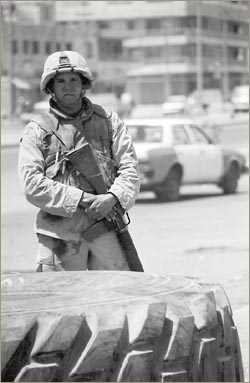 |
 |  |
|||||||
 |
Home | The Sunni Heartland | The Unexpected War | Paying the Price |
|||||||
|
The Unexpected War Ill-prepared for peacekeeping
"These guys," explains Henry, "trained for a year how to be killers. There's not a switch on the back of their heads. They are human beings-you don't change from one day to the next." Sergeant Henry and Captain Thomas Longo served as the medical mental health team for the 3rd Infantry Division. "To make that shift from the things that they were trained and trained and trained to do, to all of a sudden say, 'Don't to that anymore' - that's where a lot of the anxiety comes." Anxiety that also comes from working with the wrong equipment. Heavy tanks and bradley fighting vehicles are not much good for peacekeeping. Thin-skinned humvees are not much protection against grenades and homemade bombs, the weapons of the Iraqi insurgency. In post-war Iraq, the U.S. military has conflicting jobs: eliminate the resistance, which often meant terrorizing Iraq civilians who got in the way; and maintaining law and order, which meant becoming the local friendly police force, in a country where every institution had collapsed. Next: "Bring 'em on" |
||||||||
